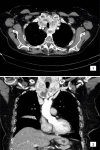Heart failure as a serious complication of iodinated contrast-induced hyperthyroidism: case-report
- PMID: 34670545
- PMCID: PMC8527761
- DOI: 10.1186/s12902-021-00870-y
Heart failure as a serious complication of iodinated contrast-induced hyperthyroidism: case-report
Abstract
Background: exposure to iodinated contrast media (ICM) can cause hyperthyroidism, due to disruption of thyroid hormone regulation. Although rare, it can have severe consequences and can lead to fatal complications. Current guidelines do not recommend standard laboratory testing of the thyroid function prior to ICM exposure. Prophylactic treatment of patients at higher risk of hyperthyroidism is not advised.
Case presentation: we report the case of an 82-year-old woman who developed ICM induced hyperthyroidism after undergoing a chest computed tomography (CT). One month after ICM administration she presented with pneumonia at the emergency department. Hyperthyroidism was found with concomitant tachycardia, which was hard to control. As a result of hyperthyroidism and coincidental pneumonia the patient developed heart failure and died of myocardial ischemia.
Conclusions: this case report underlines the importance of close monitoring of high-risk patients after ICM exposure. Clinicians should be aware of the risk of hyperthyroidism and potential severe complications. The use of ICM needs careful consideration, especially in the elderly who suffer more often from multinodular goitre.
Keywords: Hyperthyroidism; ICM; Iodinated contrast media; Iodine-induced; Tachycardia.
© 2021. The Author(s).
Conflict of interest statement
The authors declare that they have no competing interests.
Figures
References
-
- Alkhuja S, Pyram R, Odeyemi O. In the eye of the storm: Iodinated contrast medium induced thyroid storm presenting as cardiopulmonary arrest. Hear Lung J Acute Crit Care. 2013;42(4):267–9. Available from: 10.1016/j.hrtlng.2013.04.002. - PubMed
Publication types
MeSH terms
Substances
LinkOut - more resources
Full Text Sources
Medical
Research Materials



